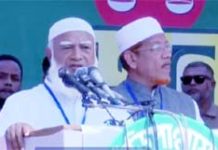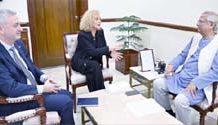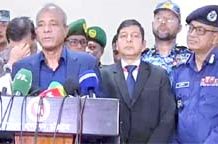C T Online Desk: People from all walks of life are paying tributes to veteran freedom fighter and Gonoshasthaya Kendra founder Dr Zafrullah Chowdhury at the Central Shaheed Minar in the capital.
His mortal remains will be kept at the Central Shaheed Minar for three hours from 10:00am on Thursday for the people to pay their last respects to the liberation war hero. He will also be given guard of honour there.
Later, his first namaz-e-janaza will be held at Suhrawardy Udyan at 2:30pm today. The body will be taken to Gonoshasthaya Kendra in Savar tomorrow where his second namaz-e-janaza will be held.
Gonoshasthaya Kendra Trustee Board and family members are yet to take decision on whether the body will be buried or donated for facilitating medical research.
Dr Zafrullah, one of the founders of Bangladesh Field Hospital set up in Agartala to treat the injured freedom fighters during the War of Liberation in 1971, passed away at Gonoshasthaya Nagar Hospital in Dhanmondi on Tuesday night.
Dr Zafrullah Chowdhury was admitted to Gonoshasthaya Nagar Hospital on April 5 following deterioration of his condition. He was put on life support on Monday.
He had been suffering from kidney complications for a long time. After getting infected with Covid-19 in 2020, he developed liver problems. He had also been suffering from malnutrition and blood poisoning by bacteria. A pall of gloom descended on the country’s political and health arena soon after the news of his death spread.
Born on December 27 in 1941 at Chattogram’s Raozan, Zafrullah Chowdhury got admitted to Dhaka Medical College after passing matriculation from Nabakumar School in Bakshibazar and intermediate from Dhaka College.
While studying there, Zafrullah Chowdhury was elected general secretary of the students’ council of the college. During that time he raised voice against ‘corruption and mismanagement’ of the college through a press conference.
Following completion of his MBBS course in 1964, he travelled to the UK to pursue higher studies.
Dr Zafarullah formed Bangladesh Medical Association in London towards the beginning of the country’s War of Independence.
In April 1971, a week before his FRCS exams in the Royal College of Surgeons, UK, Dr Zafrullah during a rally at Hyde Park, tore apart his Pakistani passport and burnt it protesting the genocide in Bangladesh by Pakistan army.
He, along with his friend Dr MA Mobin, collected Indian travel permits and boarded a plane to Delhi, sacrificing his dream of getting the degree for which he studied for four years.
They reached the battlefield via India. Dr Zafrullah initially took guerrilla training at Melaghar in Agartala. Later, being patronized by sector commander Khaled Miosharraf, they set up 480-bed Bangladesh Field Hospital to treat the injured freedom fighters.
Dr Zafrullah imparted training to ordinary people to work as staff of the hospital. As a vascular surgeon, he conducted numerous operations there to cure the war-injured freedom fighters.
After independence, he shifted Bangladesh Field Hospital in Dhaka’s Eskaton and relocated it to Savar after renaming it as Gonoshasthaya Kendra at the request of Bangabandhu Sheikh Mujibur Rahman with an aim to make rural Bangladesh the centre of development. Half of the workers of Gonoshasthaya Kendra were women.
Dr Zafrullah became a member of the national committees on education and women in 1979. He was the chief adviser of the expert committee for Bangladesh national medicine policy in 1982.
Following the expert committee’s recommendations, it was possible to create a strong base of the local pharmaceutical companies and free the country’s pharmaceutical sector from the clutch of multinational pharmaceuticals.
The boom the country’s local pharmaceutical industry now witnessing is a direct outcome of that drug policy. Bangladesh now exports drugs, in addition to meeting 95 percent of local demand.
Without being a member of any political party, Dr Zafrullah was active in politics with all his unconventional ideas. Till the last days of his life, he moved around in wheel chair to remain vocal for any issues related to public interests and against any sort of injustice.
Dr Zafrullah Chowdhury got numerous national and international awards, including Independence Award in 1977 and the Ramon Magsaysay Award, known as the Nobel award of Asia, in 1985.
Later in 1990, he received an honorary FCGP from the College of General Practitioners. In 1992, he got the Right Livelihood Award from Sweden. The University of California, Berkeley honoured him with the International Health Hero Award in 2002.
In May 2009, he was awarded a Doctor of Humanitarian Service by the World Organisation of Natural Medicine of Canada.














